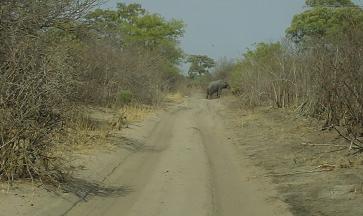
Botswana
After seeing Victoria Falls, we left this little tourist hell and drive due west to the Botswana border. Filled with angst that we were going to encounter another Beitbridge, we were pleased to find a peaceful and efficient border crossing. The lesson we learn is that when crossing through the Zimbabwean border one should always travel through small, low traffic custom stations. Odd, however, was the agricultural inspection on the Botswanan side where we had to drive the truck tires through an insecticide bath, wipe our shoes on an impregnated footmat, and answer twenty questions about any meat products we might be carrying.
Coming in from Victoria Falls presents one with a choice: you can take the easy way through Botswana, or you can take the hard way. The easy way follows the main highway down through the capitol Gaborone and the second largest city Francistown. The rough way takes you off the pavement around the edge of the world's largest inland river delta created by the Okavango River. While people suggest that you travel in convoys through the route, our friend Sue did it in one truck and only got stuck once. Sounds like an adventure to us, so we decide to challenge Spot and aim it down the road less traveled, through Chobe.
Chobe National Park
November 9th - November 11th, 1999

After crossing the border we camped out for a few days in the only caravan park in Kasane, Chobe Safari Lodge. Though they mostly cater to the high-dollar hotel room and hut crowd, the lodge also maintains a small camping site right on the border of Chobe National Park, with only an electric fence to keep the elephants out. As smaller critters could easily get in, we expected nighttime visitations but were unprepared for what occurred. At about four in the morning our neighbors in the next camp site made a tremendous racket, and continued with lots of talking and walking about. Awoken, both of us felt it was rude to be making this sort of noise this early and then rolled over and went back to sleep. It wasn't until after our first cup of coffee that we learned our neighbors had been robbed while they slept. Seems someone went into their camp, poked around and then cut open one of their tents and stole a briefcase containing one family's money and important papers. Why they kept them in a briefcase is beyond us, but they awoke in time to see the briefcase pulled out, and were able to club the thief before he blended into the night. Their empty briefcase was found on a bus later that morning, but the loss ended their vacation that morning, and they traveled back to South Africa.
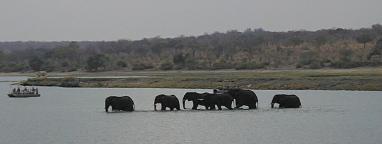 It's fortunate for us that we're paranoid
city people and always lock up the truck before retiring. Kathy is sure
she felt someone gently tug at our doors before all the commotion; if we
had been less cautious, the loss could have been ours. While we tried not
to let the incident color our view of Kasane and Chobe, it seemed our visit
here had this off-flavor to it. We took advantage of what they call here
a "booze cruise" to boat along the Zambezi and see the terrain
and wildlife. While at times interesting, one encounter with the wildlife
left us feeling disturbed. Our boat was fortunate to encounter a herd of
elephants as they began to forde the river. Within minutes, the poor elephants
found themselves surrounded by nine boats, some positioning themselves very
close to the herd. The river crossing is difficult enough as it is for the
elephants, with even the largest one treading water; with all the boats
crowding around the elephants felt doubly nervous. We felt the tour guides'
behavior was unnecessary, and felt sad to contribute to it by even taking
this cruise.
It's fortunate for us that we're paranoid
city people and always lock up the truck before retiring. Kathy is sure
she felt someone gently tug at our doors before all the commotion; if we
had been less cautious, the loss could have been ours. While we tried not
to let the incident color our view of Kasane and Chobe, it seemed our visit
here had this off-flavor to it. We took advantage of what they call here
a "booze cruise" to boat along the Zambezi and see the terrain
and wildlife. While at times interesting, one encounter with the wildlife
left us feeling disturbed. Our boat was fortunate to encounter a herd of
elephants as they began to forde the river. Within minutes, the poor elephants
found themselves surrounded by nine boats, some positioning themselves very
close to the herd. The river crossing is difficult enough as it is for the
elephants, with even the largest one treading water; with all the boats
crowding around the elephants felt doubly nervous. We felt the tour guides'
behavior was unnecessary, and felt sad to contribute to it by even taking
this cruise.
Needless to say, we were ready to leave Kasane for the interior of Chobe National Park, even though it meant facing some of the toughest terrain in the region. Chobe is essentially an uninhabited sandy desert, watered only by the Zambezi and Okavango at the edges, and the occasional summer rain. To get to our campgrounds in Savuti, we needed to drive 150 kilometers through sand that was at times a meter deep and across a very large dune. Our sand driving experience up to this point was slight, limited to a few short stretches in Nwandedi reserve in South Africa. However, we knew what to do (don't stop!) and felt prepared.
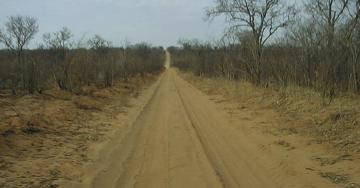 We thought that driving through sand would at least be a
smooth if not slow ride, but we were quite wrong. When driving in such a
track, the trick is to stay in the ruts of the vehicles that have come before
you. While it is easier going than just blazing across the dunes, it turns
out that it's not just the sand that's rutted. The underlying ground is
also rutted, but those ruts are rendered invisible by the sand. Those ruts
are the ones that grab your steering wheel and tear it out of your hands,
and the ones that cause your truck to leap into the air at you bounce over
them. Some of these ruts in the ground can be a meter deep, dug out by big
overland trucks with far more ground clearance than Spot. We heard of horror
stories of 4WDs hitting these ruts and getting all of their wheels suspended
in the air.
We thought that driving through sand would at least be a
smooth if not slow ride, but we were quite wrong. When driving in such a
track, the trick is to stay in the ruts of the vehicles that have come before
you. While it is easier going than just blazing across the dunes, it turns
out that it's not just the sand that's rutted. The underlying ground is
also rutted, but those ruts are rendered invisible by the sand. Those ruts
are the ones that grab your steering wheel and tear it out of your hands,
and the ones that cause your truck to leap into the air at you bounce over
them. Some of these ruts in the ground can be a meter deep, dug out by big
overland trucks with far more ground clearance than Spot. We heard of horror
stories of 4WDs hitting these ruts and getting all of their wheels suspended
in the air.
However, this was not our fate. While the drive took almost four hours and numerous small camping items died as the crates they were in were tossed like chafe in a tornado, we made it through without even getting stuck once (although we were holding our breath a few times). We thought the camp would provide a haven from the sand, but we were quite mistaken. The entire camp was built on dunes almost as deep as anything we saw on the drive in. We practically had the camp to ourselves with only one other couple there.
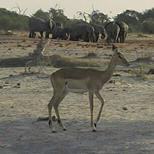 Just before dusk we went wildlife viewing
at the nearby waterhole and saw an incredible example of the hardships faced
by the animals during the dry season. Initially besides us there were only
a few impala when out of the savanna comes a herd of elephants, running
at the sight of the water. Usually elephants take their time as they walk,
but these had been out all day in the hot desert sun and were desperate
for a drink. At first they were all business and quietly took very long
drinks. Once their thirst was satiated, they soaked their feet and played
a bit. Satisfied and cooled down, most of the herd turned to go but stopped
a dozen meters and watched as the alpha male stayed and started cavorting
in the water. The bulk of the herd attempted to leave again and again but
turned back and rejoined the big male playing in the pool. The herd was
still splashing around when we left to go back to camp before the sun set.
Just before dusk we went wildlife viewing
at the nearby waterhole and saw an incredible example of the hardships faced
by the animals during the dry season. Initially besides us there were only
a few impala when out of the savanna comes a herd of elephants, running
at the sight of the water. Usually elephants take their time as they walk,
but these had been out all day in the hot desert sun and were desperate
for a drink. At first they were all business and quietly took very long
drinks. Once their thirst was satiated, they soaked their feet and played
a bit. Satisfied and cooled down, most of the herd turned to go but stopped
a dozen meters and watched as the alpha male stayed and started cavorting
in the water. The bulk of the herd attempted to leave again and again but
turned back and rejoined the big male playing in the pool. The herd was
still splashing around when we left to go back to camp before the sun set.
The evening's camping was a dramatic one, as gigantic thunderstorms passed not more than twenty kilometers south of us. We really thought we were going to get drenched, but instead were treated to a spectacular display of lightning that started perhaps ten kilometers high in the air and spanned the entire horizon. We were far enough away that there was little thunder, so there was nothing to cover the roar of the prides of lions as they patrolled around and through the camp.
As we left the next day to continue south our spirits were buoyed by the camp gatekeeper who told us the road south was much easier than the northern road we traveled in on. Sadist! Not only was the road worse, it was twice as long and unmarked! We smashed a rear side window as a water container was shaken loose from the roof rack and swung against the glass, hanging by what was left of its tie-dow strap. Once we left Chobe park, we encountered a series of parallel tracks through the desert sands, all unmarked. With the understanding that they all supposedly lead to the main highway to Maun, we chose one and crossed our fingers. Traffic in these parts is very light, and dividing it among a series of roads means that each track sees one or two vehicles a day. Breaking down or getting stuck here would mean camping out on the road until someone just happened to wander on by.
We're pleased to say we made it without major difficulties. Though we came upon the pavement battered and shaken, we didn't even get stuck once. Our only major casualties were one broken window, two broken twenty liter water containers and the last water container badly mangled. We celebrated by driving straight up to one of Maun's nice restaurants and treating ourselves to a hearty lunch and many, many beers.
While it was an adventure to travel through Chobe, we don't think we
would go again. Chobe is operating under one of the largest elephant populations
of any park in southern Africa, and the forests are a mess because of it.
Our experiences simply weren't worth the hardships associated with travel
through the park.
Maun and Moremi National Park
November 12th - November 17th, 1999
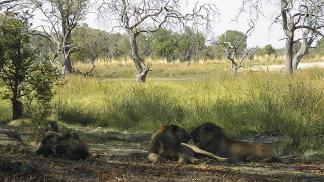
We stayed in Maun a few days to stock up on supplies and prepare for our next Botswanan park. Maun lies just south of the world's largest inland river delta, the Okavango delta. It's thought that the Okavango once emptied into a large inland lake, but as the region got dryer the lake disappeared and the Okavango instead fanned out into the surrounding desert, bringing life everywhere it touched. It's one of the world's unique ecologies, and smack dab in the middle of it is our next destination, Moremi National Park.
While the roads are just as bad as Chobe's, fortunately they're much shorter and didn't present the same hardship. Perhaps it helped that we had already broken everything breakable. At any rate, we made our way to our campsite towards the end of all of Moremi's roads, Third Bridge. Quite literally the third wooden bridge (below), it crossed one of the riverlets that holds water all year round and is home to the whole spectrum of African wildlife. Our arrival even scared away a herd of zebra that were grazing in our campsite, and the site showed signs of elephant visitations. Oh boy!
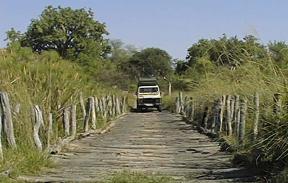
The remainder of our first day at camp was mellow and hot. As we were preparing dinner, we were treated with one of the nicest sunsets of our trip. We also were visited by about fifty baboons; seems the tree we were camped under was the tree they take shelter in for the evening. Fortunately, they left us alone and quieted down rather quickly, allowing us to clean up and go to sleep in peace.
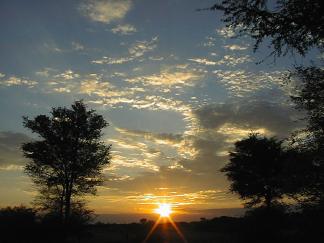
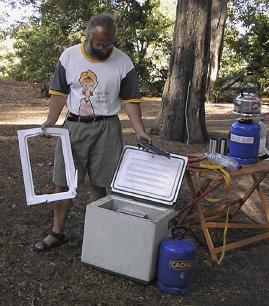 Safe in our rooftop tent, we're out of reach
of most of Africa's wildlife, but not out of reach of the noises they make.
Some evenings it can be difficult to get to sleep with all the rustling,
roaring and romping of the nighttime animals. This evening in Moremi started
out quite peacefully. However, at around midnight Kathy was awoken by the
sound of something large prowling around the truck. She looked out one of
our tent's windows just in time to see a large lioness pick up our refrigerator
and drag it off into the bush! We place it outside the truck when we run
it on LP gas, and keep it secured with a thick strap and a heavy rock or
two on top. This lioness picked it up by the strap as if it weighed nothing.
It stopped once it reached the edge of the trees as the LP gas container
had hung up on some roots. Awake by now, Jim considered going out there
and driving the truck towards the lion to scare it away when we noticed
many sets of eyes reflected by our flashlight's beam. A pride of lions was
watching to see what happened next. One lion was dangerous enough, but to
leave the safety of the tent when a pride was about would be crazy, so we
resigned ourselves to watching our poor fridge's fate.
Safe in our rooftop tent, we're out of reach
of most of Africa's wildlife, but not out of reach of the noises they make.
Some evenings it can be difficult to get to sleep with all the rustling,
roaring and romping of the nighttime animals. This evening in Moremi started
out quite peacefully. However, at around midnight Kathy was awoken by the
sound of something large prowling around the truck. She looked out one of
our tent's windows just in time to see a large lioness pick up our refrigerator
and drag it off into the bush! We place it outside the truck when we run
it on LP gas, and keep it secured with a thick strap and a heavy rock or
two on top. This lioness picked it up by the strap as if it weighed nothing.
It stopped once it reached the edge of the trees as the LP gas container
had hung up on some roots. Awake by now, Jim considered going out there
and driving the truck towards the lion to scare it away when we noticed
many sets of eyes reflected by our flashlight's beam. A pride of lions was
watching to see what happened next. One lion was dangerous enough, but to
leave the safety of the tent when a pride was about would be crazy, so we
resigned ourselves to watching our poor fridge's fate.
Nervous by our flashlight, the lioness eventually pulled the refrigerator
free of the LP gas container and carried it deeper in the bush. Then the
cracking and crunching noises began. It took the lion nearly an hour to
break open the refrigerator! We were surprised it took so long; we had figured
a lion could chew through the woven strap quicker than that. Once open,
we heard the noises of ketchup and coke bottles being tossed about, and
then it became quiet. A hyena passed on by shortly thereafter, but soon
left and all we could hear was the noise of LP gas hissing in the darkness.
Deciding that little was left to do but pick up the debris, we stayed inside
the safety of our tent and unsuccessfully tried to get some sleep in before
the dawn.
Determined to beat the baboons to what's left of our food (remember, there are fifty of 'em in the trees), we briefly ventured out when the sky lightened before dawn to gather up what we could find. Returning to our tent to await the full sun, we fell asleep until we were awoken by the sound of heavy thuds impacting the ground all around us. Confused, we thought that perhaps the baboons had woken up and figured out how to throw stones at us. Peering out, we learned the startling truth. Yes, the baboon tribe was waking up, but instead of immediately hopping out of the trees they were staying put and defecating right from their branches! Fortunately, none of them scored a hit on Spot or our tent. Man, what a morning!
Once the baboons had gone, we climbed out, started some coffee, and took inventory of the refrigerator contents. Gone was all the meat, milk, butter, cheese and yogurt -- all the stuff a cat would eat. Surprisingly, the candy, fruits, vegetables and all bottled stuff remained. Another foray into the bush yielded the last remaining pieces of the fridge, and a quick check showed that the top still fit its hinges, and the bits more or less lined up in their original positions. Though banged up and dragged over fifty meters, hooking up the refrigerator to our remaining LP canister showed that it still worked.
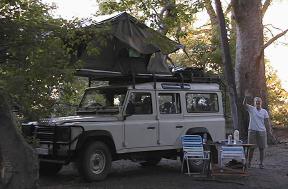 We moved our camp underneath a smaller shade
tree that the baboons didn't sleep in well out of plop range (photo right)
and were grateful that we had plenty of canned food to last us several days.
Subsequent discussions of our lion attack with experienced African campers
usually results in great surprise that a lion would resort to stealing a
camping refrigerator -- no one has heard of it happening before. All in
all, we consider ourselves lucky. People have died from lion attacks in
Moremi.
We moved our camp underneath a smaller shade
tree that the baboons didn't sleep in well out of plop range (photo right)
and were grateful that we had plenty of canned food to last us several days.
Subsequent discussions of our lion attack with experienced African campers
usually results in great surprise that a lion would resort to stealing a
camping refrigerator -- no one has heard of it happening before. All in
all, we consider ourselves lucky. People have died from lion attacks in
Moremi.
The rest of our time in Moremi was relatively uneventful, and we found
it a very beautiful and lush place. The Okavango delta really is an African
paradise, and we wish Botswana didn't require phone reservations for camping
there; we may have stayed longer.
Drotsky's Cabins
November 18th - November 19th, 1999
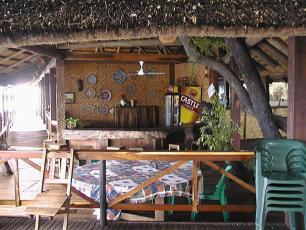
After a few more days in Maun, we felt we had enough of sand and the Botswanan heat, so we decided to make our way for Namibia and the Caprivi strip. On our way was a lodge that caters to fishermen: Drotsky's Cabins. Hearing good things about it, we decided to make a stop over and see how the Okavango looks when its a wide and full river. We found a very pleasant and relaxing lodge with wonderful food and a great honor bar. Overlooking a sea of reeds, we recommend Drotsky's for anyone visiting northern Botswana.
One exceptional incident happened to us while at Drotsky's. The sky opened up on us our last night there and drenched the camp with sheet rain and stinging winds. Unable to sleep, we counted the seconds between the lightning flashes and the thunderclaps, finding them usually around two to four seconds. Then came the bright flash with a simultaneous and loud boom! That one was close, near enough to shake the truck. Morning revealed that lightning had scored a direct hit on a tree next to Drotsky's parking lot, not more than 150 meters from our camp. Upon that tree was mounted a light (perfect ground!); the tree was split open, the light was melted and the resulting surge popped all their circuit breakers and blew out the owners big screen TV and satellite dish. He was none too pleased.
Thoughts about Botswana
We must admit that if you look on what we've written about the African countries we've visited so far, we seem to always be critical of their ways. It's with pleasure that we exclaim that Botswana is one African country that has its act together. For a virtual desert land to be able to have an excess of wealth and then equitably spread it around is wonderful to see, and becomes incredible when you realize it's in Africa. Wildlife conservation and management are national priorities, and not merely nuisances. Sure, some of the roads are rough, but one African explained that they want them that way. "If the roads to Chobe and Moremi were paved, so many tourists would visit that those parks would be ruined." he declared.
Much of Botswana's strengths come from the fact that its peoples are one tribe, and are able to avoid the tribal conflicts that bring ruin to most of Africa. That, and the foresight to understand that their nation is a limited one and can't be endlessly exploited combine to make Botswana one of the richest and most just nations in southern Africa.